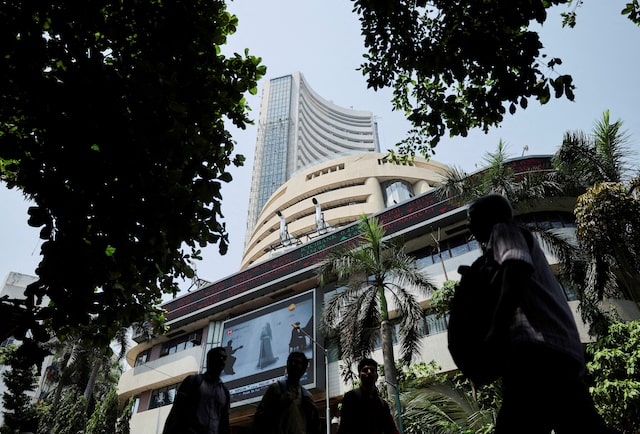Men walk past a screen displaying market results outside the Bombay Stock Exchange (BSE) in Mumbai, India, April 7, 2025. REUTERS.
July 11 (Reuters) – Indian shares edged lower in early trade on Friday, as a slide in IT stocks following Tata Consultancy Services’ (TCS.NS), weak results outweighed gains in consumer giant Hindustan Unilever.
The Nifty 50 (.NSEI), fell 0.37% to 25,262 points, while the BSE Sensex (.BSESN), lost 0.41% to 82,854.18 as of 10:13 a.m. IST.
Ten of the 13 major sectors were down. The broader small- (.NIFSMCP100), and mid-caps (.NIFMDCP100), traded about 0.6% lower each.
Investors also weighed comments from U.S. President Donald Trump, who said he would impose a 35% tariff on imports from Canada next month and was considering blanket tariffs of 15% to 20% on most other trade partners.
The IT index (.NIFTYIT), fell 1.1, dragged by an about 2.1%drop in TCS, and its peers Infosys (INFY.NS), and Wipro (WIPR.NS).
TCS, India’s top software services exporter, missed first quarter revenue estimates on Thursday as its clients stayed cautious about non-essential spending amid tariff-related uncertainty.
“We are seeing companies not delivering on earnings getting punished in the market,” said Vinit Bolinjkar, head of research at Ventura Securities.
Hindustan Unilever (HLL.NS), surged 4.4, and was on course for its biggest daily percentage gains in over a year, after the consumer goods maker named Priya Nair, an insider at its parent Unilever (ULVR.L), as its chief executive.
Among other stocks, Tata Elxsi(TTEX.NS), and Indian Renewable Energy Development Agency (INAR.NS), fell about 4% and 5%, respectively, while Anand Rathi Wealth (ANAA.NS), added 5% following the first quarter earnings.
Glenmark Pharmaceuticals (GLEN.NS), surged 10% a day after its unit signed an exclusive licensing deal with U.S. peer AbbVie (ABBV.N), for its cancer treatment.
Bolinjkar expects the market to remain stock-specific in the near term amid earnings season, but sees broader downside risks due to tariff uncertainty and likely pressure on bank net interest margins.
Reporting by Vivek Kumar M and Bharath Rajeswaran; Editing by Sumana Nandy and Rashmi Aich





